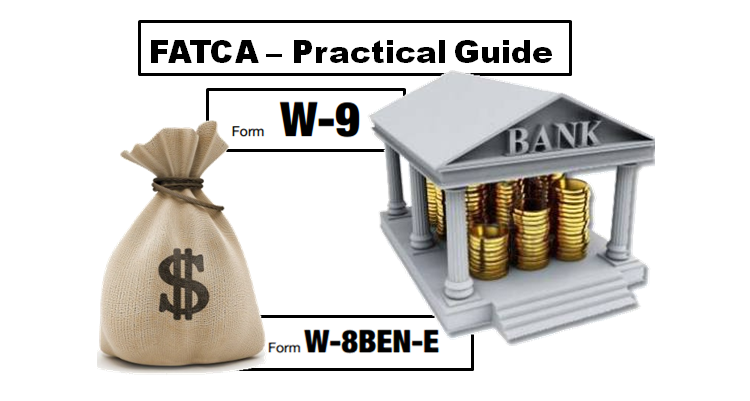
FATCA – Practical Guide
There are over 100 countries around the world that are now “FATCA-compliant.” This means that banks located in those countries will be sending to the IRS detailed information regarding accounts held by US persons. In this article, we will discuss how FATCA is affecting the average US expat or dual citizen (including business owners), and the options for dealing with the requirements.
FATCA – Practical Guide
What is FATCA (Foreign Account Tax Compliant Act)?
FATCA is part of a broader effort by the U.S. government to combat offshore tax evasion. Countries that have a FATCA agreement with the US will begin reporting bank account information of US person to the IRS. This means that the IRS will know how much money you have in foreign bank accounts even if you do not report this information.
What are the FATCA reporting requirements?
In addition to reporting foreign interest income, you may need to file certain informational reports: FBAR (FincCen 114) and Form 8938 .
If you have not been: (1) reporting foreign interest income, or (2) filing US tax and other informational returns, then you have some thinking to do. The IRS will have specific information regarding your foreign accounts, and will complete an assessment of what it believes you owe. IRS assessments are typically much higher than if you had filed proactively.
My bank is asking me to complete a W-9 form. What should I do?
In the United States, the W-9 is a basic form that people fill out when they start a new job or open a new bank account. The critical information captured on the W-9 is the Social Security Number. When foreign banks send to the IRS your account balance and interest income information, it will be attached to your name and Social Security Number. The IRS computers will be able to cross-reference the information sent by your bank against your US income tax return and FBAR (foreign bank account report) filing. Discrepancies will be red-flagged, although any action by the IRS will likely take several years. Keep in mind that penalties and interest accrue in the meantime.
When the bank asks you to complete a W-9, you have 3 options:
• Refuse – your bank will likely close your account for non-compliance
• Delay – take the form home with you, and hope the bank doesn’t ask again. Depending on the country and bank, this may work (will not be the case in most developed countries)
• Fill it out – you are being compliant with US tax laws. It will be important that you are also compliant with your tax return and FBAR filing requirements.
Dual citizens have an additional option. If the bank inquires about their U.S. citizenship, they can deny having dual citizenship status. Of course, that would be an act not be compliant with US tax laws, and carries risks.
I have a business account at the bank. Should I be worried?
Foreign banks may report business account information to the IRS. The consequences would be severe. That is because there many Americans do not report their foreign businesses although it is required. Some report only the wage they pay themselves.
Each FATCA-compliant country and foreign banks are taking their own approach in dealing with US customers. Recently, a client in the Cayman Islands was told by her bank to provide proof of her Form 5471 (report on foreign corporation) and FBAR filings. Another client (in Mexico) was asked by his bank to complete a W-8 Ben-E. This form is used by US companies that do business with foreign entities, so that they can withhold taxes correctly. In most case, the bank is incorrect in asking US expats to complete a W-8 Ben-E.
Overview of FBAR (Foreign Bank Account Report)
U.S. persons with an interest or signature authority over foreign financial accounts that have an aggregate balance exceeding $10,000 are required to file the FBAR. The $10,000 threshold is met if the aggregate balance (combining all the accounts) exceeds $10,000 at any point during the year. The FBAR is a separate from your income tax filing. Account balances need to be converted to USD, using the F/X rate as of the last day of the year. Failure to report (non-willful) carries a penalty up to $10,000. Willful non-compliance potentially raises the penalty up to $100,000 or 50% of the taxpayer’s foreign assets (whichever is greater).
Overview of Form 8938 – FATCA (Foreign Account Tax Compliant Act)
Form 8938 is included with your income tax filing. All US persons who have certain foreign assets that have an aggregate balance exceeding set thresholds are required to file Form 8938:
• For expats filing an individual tax return, the threshold is $200,000 in aggregate balance on the last day of the year, or $300,000 aggregate balance at any point during the year;
• For expats filing a joint tax return, the threshold is $400,000 in aggregate balance on the last day of the year, or $600,000 aggregate balance at any point during the year
The maximum penalty for failing to file Form 8938 is $60,000 for each foreign asset that you failed to report (even more onerous than for the FBAR).
Aside from the above, there are additional penalties, and interest charges may apply. Furthermore, the ability to claim the Foreign Earned Income Exclusion is jeopardized when the IRS pursues you. Last but not least, the amount of paperwork is significantly less when you come forth voluntarily, as opposed to responding to an IRS notice.
Bottom line: The world is getting smaller, and privacy is increasingly hard to maintain. For US expats, FATCA is a true “thorn-in-the-side,” one that is probably better to deal with earlier than later.
For general information on US expat taxation, please read: US Taxes for Americans Living Abroad – Ultimate Guide.
